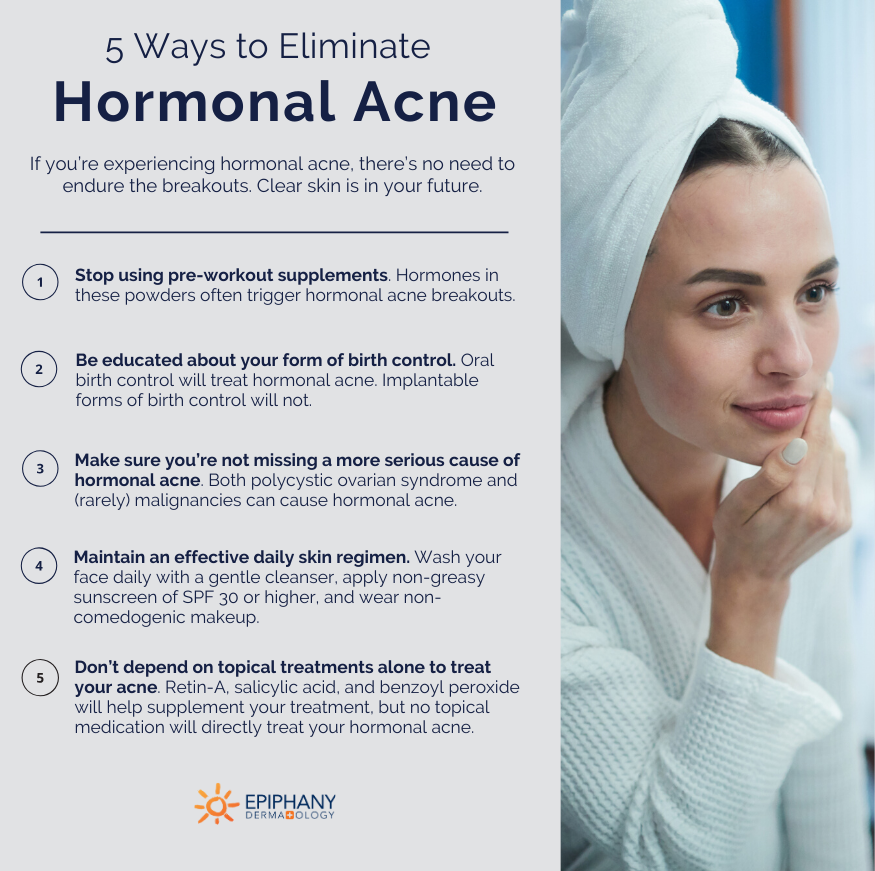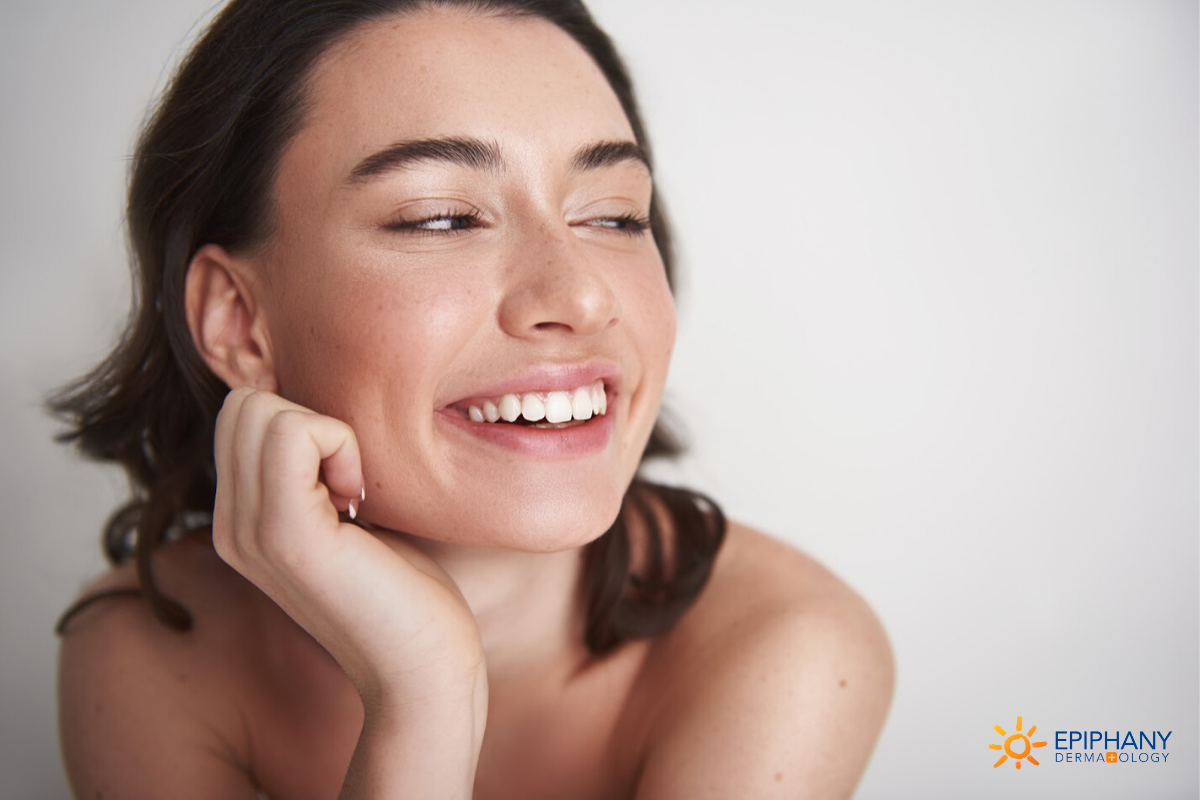Hormones are easy to blame for a world of issues — particularly for women and teenagers. With acne, it’s no different. For many teenage boys and girls, women of all ages, or men taking specific supplements, hormones could be the source of your acne problem.
Teenage breakouts are likely due to an increase of androgens (like testosterone) which results in the growth of oil glands and increases oil production. Women, while your teenage years bring similar changes in androgens, you have a more complex hormonal environment due to menstrual cycles that may continue to cause hormonal acne.
Medications can trigger hormonal acne as well. Men or women taking testosterone supplements or anabolic steroids may notice an increase in hormonal acne while on these medications.
If you suspect hormones may be the cause of your breakouts, here’s how to identify and how to get rid of hormonal acne.
Signs of Hormonal Acne for Women
In women, hormonal acne can be identified primarily by two factors: location and timing.
Hormonal acne shows up in the places where you’re more sensitive to androgens. Think of it like this: If you were a man, where would you grow hair? If you breakout on the jaw, chin, neck, chest, and back, hormones are a likely cause.
Hormonal acne also coincides with your cycle. Do your breakouts flare up right before or during your period? If so, that’s a clue that a hormonal component is affecting your acne.
Regular acne tends to be steady. There’s no identifiable flare, and it doesn’t affect places where a man would grow hair differently than other areas.
How to Get Rid of Hormonal Acne
Before we start treatment, we need to look for a potential underlying cause. We want to make sure we’re not missing a major diagnosis and only treating the acne.
1. Eliminate Triggers
When possible, it’s better to eliminate the trigger rather than medicate the side effects from it. Let your dermatologist know if you’re taking testosterone supplements, other hormones, or dietary supplements. While there’s a clear connection between hormone supplements and hormonal acne, much remains unknown about how pre-workout powders and protein supplements affect breakouts. Often, people notice a significant improvement in their acne if they stop using these workout supplements.
2. Check for Deeper Causes
We also check for signs of more significant issues that induce hormonal acne. Acne is one of the symptoms of polycystic ovarian syndrome (PCOS). To find out if this is a potential cause, we ask women about their cycle regularity, weight gain, and unwanted hair growth. If we suspect PCOS, we’ll involve a gynecologist for testing. Early detection and treatment is important to help decrease the likelihood of potential complications such as difficulty with conception, high blood pressure, and diabetes.
3. Take Oral Acne Medication or Birth Control
If there are no additional concerns, hormonal acne is relatively easy to treat. We typically start treatment with a birth control pill containing estrogen and progesterone. The FDA has approved several contraceptive medications specifically for acne in women.
Unfortunately, the convenient forms of birth control (IUDs, arm implants, or vaginal rings) do not help with hormonal acne. These are only progesterone-based, which can make acne even worse. If a patient is already using one of these devices, we’ll use an alternative treatment rather than ask them to change their birth control method.
Spironolactone is often our first choice for patients not wanting or needing birth control. A low-dosage form of this oral pill (originally designed for high blood pressure in older women) is a highly effective method to get rid of hormonal acne.
It blocks the androgen receptors in the skin that are responding to the testosterone by increasing our oil production and making us breakout. Spironolactone essentially blocks the skin from hearing the testosterone say, “Hey, make a pimple!” It’s tolerated well by patients and can be used for long periods of time (unlike the oral antibiotics used to treat adolescent acne). It’s a highly effective option that often eliminates the need for patients to eventually take Accutane.
4. Add Vitamin A to Your Skincare Regimen
Topical forms of vitamin A can be used in conjunction with most oral acne treatments to further combat acne. People with any type of acne should apply a form of tretinoin or Retin-A prescribed by their dermatologist.

How Long Does It Take To Get Rid of Hormonal Acne?
People who struggle with acne as they age can feel especially frustrated. It seems very unfair to have wrinkles and breakouts simultaneously. When breakouts persist past adolescence, there’s typically a hormonal component we need to address.
Our patients with hormonal acne will end up with clear skin with the appropriate skin treatment — no matter their age. With oral birth control pills and spironolactone, we can make the acne go away.
Hormonal acne is treatable, but it’s not always curable. We can’t promise the acne won’t come back when you stop taking the medication. Our first goal is always clear skin. Then, we want to keep the patient on the least amount of medication possible to maintain their clear complexion. If you’re genetically predisposed to acne, it may return, but we can manage it with medication.
Women experiencing menopause may find they only need treatment for hormonal acne temporarily. After they’ve completed menopause, they can often stop using these medications.
5 Ways to Eliminate Hormonal Acne
If learning how to get rid of hormonal acne seems complex, here’s your wrap-up.
- Stop using pre-workout supplements. Hormones in these powders often trigger hormonal acne breakouts.
- Be educated about your form of birth control. Oral birth control will treat hormonal acne. Implantable forms of birth control will not. Make the decision based on your personal needs about what is best for your body. Spironolactone is an oral pill and is highly effective, but does not serve as a method of birth control.
- Make sure you’re not missing a more serious cause of hormonal acne. Both polycystic ovarian syndrome and (rarely) malignancies can cause hormonal acne. Check with your healthcare provider if you’re concerned about these potential causes.
- Maintain an effective daily skin regimen. Wash your face daily with a gentle cleanser, apply non-greasy sunscreen of SPF 30 or higher, and wear non-comedogenic makeup.
- Don’t depend on topical treatments alone to treat your acne. Retin-A, salicylic acid, and benzoyl peroxide will help supplement your treatment, but no topical medication will directly treat your hormonal acne.
If you’re experiencing hormonal acne, there’s no need to endure the breakouts. Visit an Epiphany Dermatology location near you to find the best treatment plan for your skin.

Dr. Winslow Blankenship is a board-certified dermatologist in Breckenridge and Vail, CO. She is an expert in medical dermatology and finds great reward in the management of acne, psoriasis, and other dermatologic conditions. She particularly enjoys that dermatology allows her to care for both adult and pediatric patients, having completed a significant portion of her residency training at Children’s National Medical Center in Washington, DC. In her spare time, Dr. Blankenship enjoys skiing with her husband and children.

